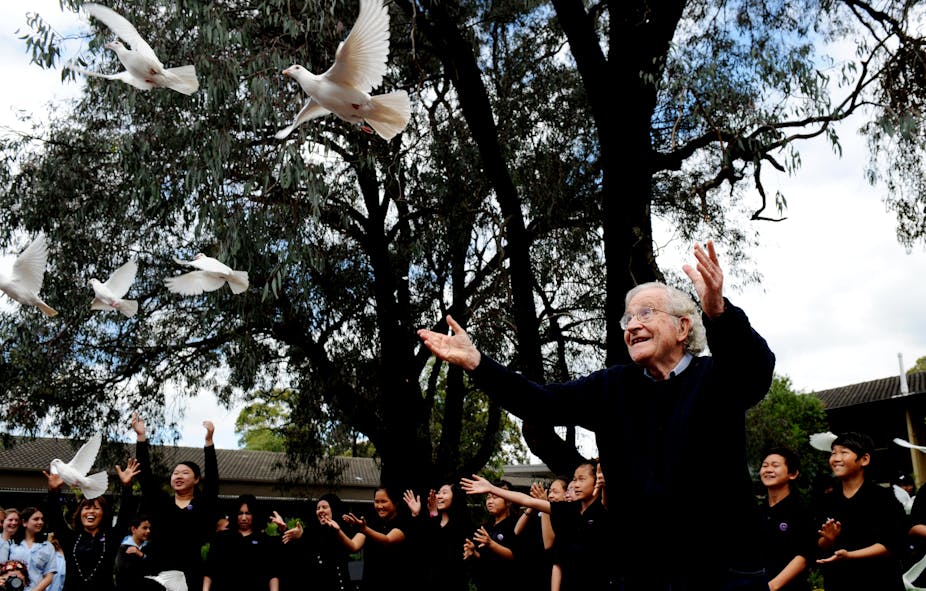Noam Chomsky’s political detractors typically resort to misrepresentation and vilification but one might expect a higher standard from academic colleagues, especially in his own discipline of linguistics.
Writing on The Conversation earlier this month, Macquarie University senior lecturer Annabelle Lukin claims that Chomsky is guilty of “preposterous” ideas and concerned with “imaginary problems.”
She characterises the flourishing field of generative linguistics which he founded as “truly the preserve of navel-gazing academics,” over which he maintains a dictatorial control, misrepresenting his own contribution and originality with “woeful” and “negligent” scholarship.
The very severity of these charges suggests that they reflect more on Lukin than on someone described in the New York Times as “the most important intellectual alive” and whom Lukin acknowledges to be “the 20th century’s most famous linguist.”
Language and politics
Lukin’s central complaint is that, ironically, despite voluminous political writing, Chomsky “explicitly rejects the idea that language might be implicated in politics” and “reject[s] any role for language in propaganda … eschewing any notion that his own discipline might provide some expertise for the analysis or deconstruction of an ideology.”
However, the real irony is that Lukin professes to be a linguist concerned with “real language” and “the actuality of what people do with language” but misses the distinction between language and linguistics and their different relation to politics. On the former, the charge that Chomsky rejects a connection between language and politics can only be made in ignorance of his vast corpus of analyses of our intellectual culture and media over 40 years.
In the footsteps of Orwell
In the very 800 page book to which Lukin refers, Chomsky writes in the tradition of George Orwell about terms like “free enterprise” and “free world” which are designed “to insinuate somehow that the system of control and domination and aggression to which those with power were committed were in fact a kind of freedom.”
Similarly, “the national interest” is used as a term of propaganda “designed, often very consciously, in order to try to block thought and understanding.”
Chomsky reveals the way that the use of terms such as “defense” mystifies our own aggression as in Vietnam. He writes “These are ways in which our intellects are dulled and our capacity for thought is destroyed and our possibility for meaningful political action is undermined by very effective systems of indoctrination and thought control that involve, as all such systems do, abuse of language.”
Different approaches
We can understand Lukin’s jaundiced misrepresentations when we appreciate that she has a different conception of linguistics as an academic or scientific enterprise. Lukin has evidently missed the essential character of Chomsky’s generative enterprise and the “Galilean” approach to “bio-linguistics” as a formal, mathematical or computational theory of the “tacit knowledge” underlying language capacities.
Just as vision may be explained in terms of the information processing in the nervous system, so our language ability may be explained by internal rules and representations we unconsciously employ when speaking or understanding language.
In particular, Lukin has misunderstood Chomsky’s point that such inquiry has, indeed, nothing to say about politics. Nor does the scientific inquiry into vision, for the same reason. Even without understanding the technicalities, it is evident that one could not derive claims about social change from syntax, anarchism from anaphora or revolution from recursion.
Lukin’s preferred way of doing linguistics may have more to say about politics but less about language since no special academic expertise is required for insight into the Orwellian use of language, only clear thinking and common sense.
Serious charges
From passing remarks in a radio interview, Lukin charges Chomsky with “woeful,” “negligent” scholarship and falsely claiming credit for key ideas. Such disparagement is all the more reprehensible because it reveals Lukin’s evident ignorance of Chomsky’s landmark historical scholarship in “Cartesian Linguistics” (1965) which traced contemporary developments back to their antecedents among the Port Royal logicians of the 17th Century.
Elsewhere, too, if not in his interview with Phillip Adams, Chomsky makes frequent acknowledgement of anticipations of his own ideas.
Few people have made such contributions to political thought and action as Chomsky, especially in helping us to understand the mechanisms of thought control in our own society.
By denigrating Chomsky’s scientific work for failing an irrelevant criterion, Lukin confirms her commitment to what Chomsky has exposed as the “fraudulent cult of expertise” which is part of the problem and not the solution.

